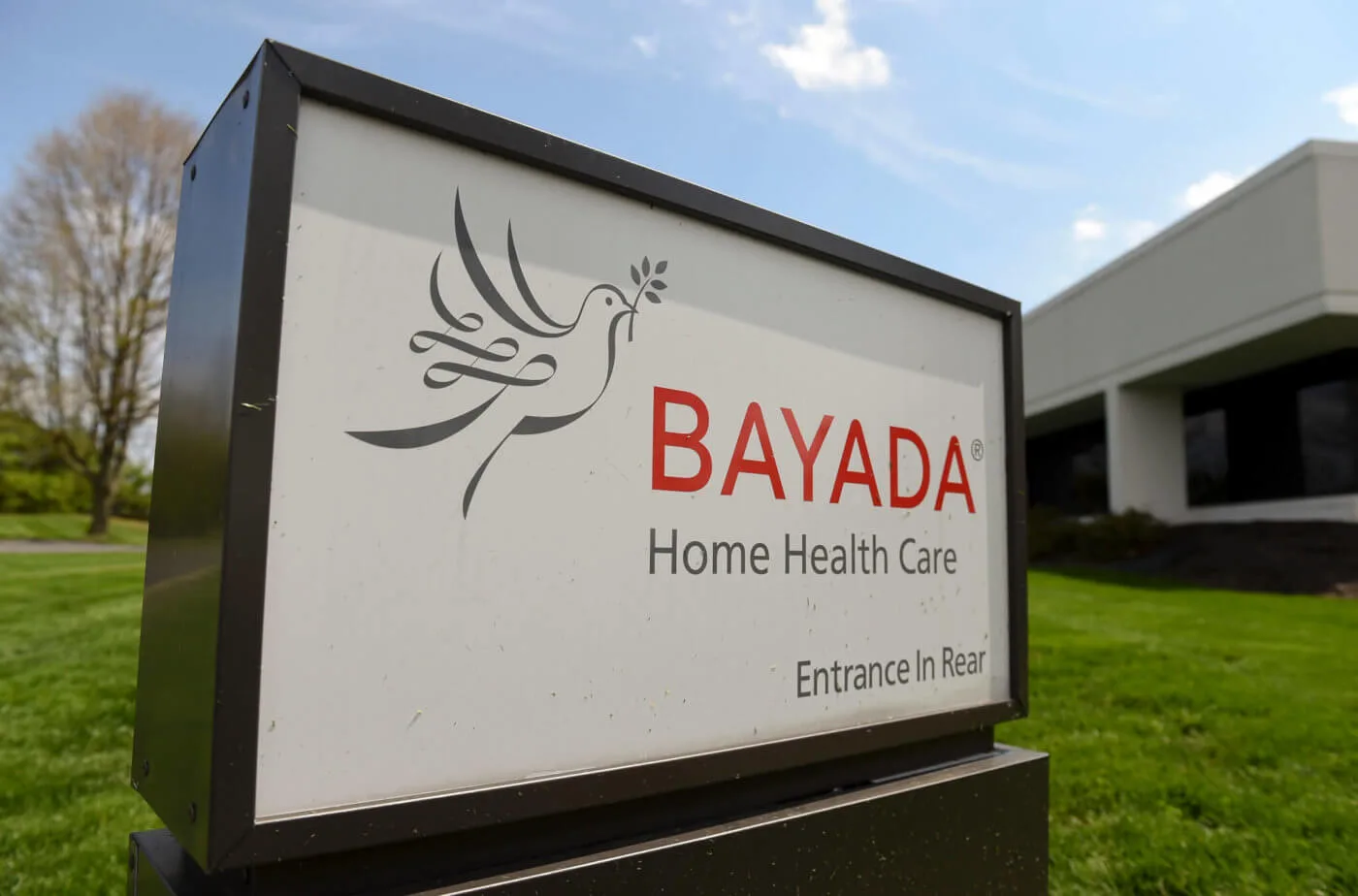
The Bayada Home Health Care office on North Wyomissing Blvd. in Wyomissing. (Getty Images)
Low pay and high turnover have long been the reality for the ranks of direct care workers in home care settings and nursing homes. The pandemic has made it worse.
HARRISBURG — Advocates for people with disabilities gathered at the state Capitol on Tuesday to protest what they say is the eroding quality of home care services under Pennsylvania’s new managed care system, problems being accelerated by the pandemic.
Part of the problem, they say, is the increased difficulty in getting direct care workers and the need to pay them more through the state’s Medicaid reimbursement system.
Gov. Tom Wolf’s administration and lawmakers, they say, should use federal dollars approved by Congress, as well as higher federal reimbursement rates, to boost wages for direct care workers.
“They have new possibilities for using this money in ways that are effective,” said Shona Eakin, CEO of Voices for Independence, an Erie-based home care services provider.
Wolf’s administration is awaiting approval from the federal government on its plan to use a higher Medicaid reimbursement rate for home-based care under the American Rescue Plan signed by President Joe Biden in March.
The plan for the money includes increasing reimbursement rates and direct care worker wages while the money lasts, Wolf’s administration said.
While the administration was unable to give details about the boost in the pay, the administration wants to use state dollars to make the increases permanent, said Jamie Buchenauer, a deputy secretary for long-term living in Wolf’s Department of Human Services.
Buchenauer could not immediately say how much money that might require, although it would require approval by lawmakers.
Low pay and high turnover have long been the reality for the ranks of direct care workers in home care settings and nursing homes.
But finding direct care workers is harder now because of the pandemic, they say. The average home care worker makes $12 an hour, and many direct care workers took a break during the pandemic and never returned, Eakin said.
Eakin’s workforce went from 1,069 before the pandemic to 763 now, while her overtime costs shot up from $227,000 in 2019 to $573,000 this year to care for about 800 people, she said.
Overtime costs aren’t reimbursed by Medicaid, and neither is personal protective equipment, paid days off, or double-time pay on holidays, Eakin said. Meanwhile, direct care workers are so hard to find that Eakin has had to turn away 40% of the people who contact her agency seeking home care services, she said.
Wolf’s administration, over the past few years, put home care services for tens of thousands of elderly and disabled under managed care contractors in an effort to save money.
The plan involved moving thousands of people back into their homes and out of the more expensive settings of nursing homes.
But people trying to transition out of nursing homes are enduring months-long waits for a home care worker to be found and assigned to them, advocates for the disabled say.
Others are seeing their hours of home care being cut by managed care companies that are now running the program under contract with the state, they say.
Wolf’s Department of Human Services said that 90% of people in the program are receiving the same level of services or more after they were assessed, which managed care organizations are required to do annually.
The department said reviews by its Office of Long-Term Living has generally found that service reductions were appropriate and not a risk to health and safety.
Lauren Alden, a manager with Liberty Resources, a Philadelphia-based center for independent living, said the organization is finding legal help for clients who are seeing care hours cut back, and trying to help them appeal.
“We’ve seen drastic cuts, and these are folks who have not had any changes in need,” Alden said.
The community-based program was designed to get people out of institutional care and back into homes, but cutting direct care hours could have the opposite effect, Eakin said.
“How long before someone buckles and says, ‘I have to get cared for,'” Eakin said.

For Rep. Susan Wild, supporting PA families includes reproductive rights and much more
Rep. Susan Wild wants to be very clear with Pennsylvanians: Donald Trump is committed to taking away women’s reproductive freedom, but he is not...

School districts working with anti-LGBTQ groups can cost your kids’ schools millions
Parents across South Central Pennsylvania are worried about the potential financial impacts working with anti-LGBTQ groups may have on their school...

VIDEO: Trump distances himself from his anti-abortion views
Donald Trump appeared on WGAL on Tuesday and continued to distance himself from his anti-abortion views claiming that reproductive rights are now a...

VIDEO: Community pushback gets school board to rescind decision on denying gay actor’s visit
Cumberland Valley School Board offered a public apology and voted to reinstate Maulik Pancholy as a guest speaker a week after the board voted to...

VIDEO: Project 2025 brings nuclear armageddon back into vogue
Project 2025 is a titanic document, with plans ranging from cutting half of all government employees to targeting reproductive rights on a scale...




